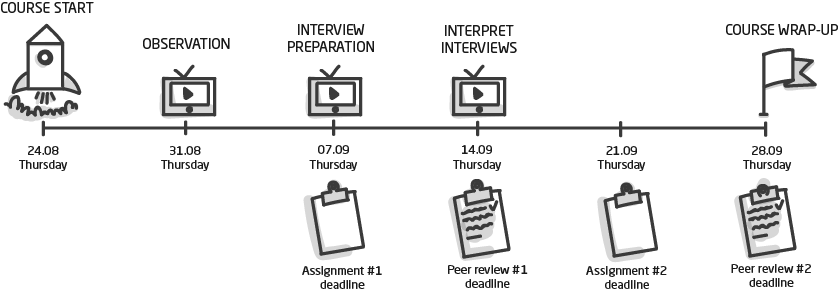
Become a proficient explorer of the world around you and find inspirations that may lead to human-centered design solutions: This course will introduce you to the basics of design research.
Language: English
English
Advanced, Beginner
Course information
This course will introduce you to crucial methods in design research, which will help you to discover inspirations for innovative solutions. We take a task-based approach to build your competencies and skills: You will learn to spot workarounds, observe potential users in their context and explore the basic skills of conducting insightful interviews.
Learning Objectives
- spot and analyze workarounds to identify user needs
- prepare and conduct good qualitative interviews
- analyze interview notes and interpret interesting findings
- evaluate the quality of your peers' work and provide constructive feedback
Course Structure
WELCOME AND INTRODUCTION / Week 1 (24.8. – 30.8.2017)
This is a chance for you to introduce yourself and get to know the learning environment and your peers with the help of an exercise.
Time commitment: 1h – 1:40h
OBSERVATION / Week 2 (31.8. – 6.9.2017)
The week focuses on the skill of careful observation and introduces you to workarounds and misuses.
Time commitment: 1h – 1:40h
QUALITATIVE INTERVIEWING / Week 3 (7.9. – 13.9.2017)
This week focuses on the role of qualitative interviewing and how to conduct a good interview.
Time commitment: 3h – 3:40h
INTERPRETING INTERVIEWS / Week 4 (13.9. – 20.9.2017)
After you conducted your own interviews, this week's module introduces you to interpreting your interview findings - the first step towards gathering inspirations for design solution!
Time commitment: 1h – 1:20h
WRAP UP / Week 5 (20.9 – 28.9.2017)
In this week, we will provide a summary of what you have learned. We will talk about future steps and discuss some of the best assignment results with you.
Time commitment: 0:30h – 1h

Target Audience
This course is best suited for those who are curious about design thinking and human-centered approaches for solving problems. No prior knowledge is required. This course is designed for individual work; it is not necessary to find a team of co-participants. Peer reviews will be allocated to your online peers.
Quotes from former learners:
“I think this MOOC is suitable for a broad audience and anyone can relate to it, even beginners.”
“The way the skills are taught in this MOOC can be learned by anyone, no matter which country you are from, which culture you belong to or in which context you want to use the design skills.”
“I realized during this course that my job is really about solving design problems. I am an architect, so my architectural design has to respond to my clients’ actual needs. Often, what my clients put on a piece of paper is not the same as what they really want. So interviewing and finding out about my clients’ hidden needs is an essential part of my job.”
“This course helped me a lot in making decisions and finding inspiration. It opened up my prior assumption of design thinking and made me realize that design thinking is not limited to one specific scientific category.”
“I am already thinking about ways to implement the qualitative interviewing method in my next projects.”
Note
This course is part of a research project that investigates the potentials and challenges of teaching design thinking in an online environment. Therefore your participation in the course surveys and feedback are very valuable to us.
Attention: This course is currently in self-study mode, in which you do not have access to graded assignments/exams. Therefore, we can only issue you a certificate of participation.
Enroll me for this course
Learners
Rating
This course was rated with 4.69 stars in average from 55 votes.
Certificate Requirements
- Gain a Record of Achievement by earning at least 50% of the maximum number of points from all graded assignments.
- Gain a Confirmation of Participation by completing at least 50% of the course material.
Find out more in the certificate guidelines.
This course is offered by

Mana Taheri is a PhD candidate at the HPI-Stanford Design Thinking Research Program. Her research interests lie in the fields of e-learning and cultural diversity. In her research projects she investigates the potentials and challenges of teaching design thinking at scale and to a global audience with diverse cultural backgrounds. Mana is also a member of the teaching team at the HPI School of Design Thinking in Potsdam, Germany. She is well experienced in designing and leading workshops in various international settings, from Tehran, to Berlin, and to Havana. Mana was born and raised in Tehran, where she earned a Bachelor’s degree in Economics before moving to Berlin to complete her Master’s in Economics and Management at Humboldt University.

Karen von Schmieden is a PhD candidate in the HPI-Stanford Design Thinking Research Program and a curator and editor of ThisIsDesignThinking.net. She has worked as a journalist and in a startup for radio technology. Karen is an alumna of the HPI School of Design Thinking, where she designed human-centered solutions in projects for Charité Berlin and the Rundfunk Berlin-Brandenburg. She studied in Maastricht, Istanbul and Lisbon and holds an M.A. in European Studies on Society, Science and Technology. She’s a co-founder of the student-led innovation group „Maastricht Disrupt“.

Lena Mayer is a PhD candidate at the HPI-Stanford Design Thinking Research Program. Her research interests lie in organizational training and (virtual) team collaboration. Lena also works as a freelance design thinking coach for organizations and universities. She graduated from Maastricht University with a M.Sc. in Work and Organizational Psychology and is currently also following a further education program in systemic communication. In the past, she has worked in several interdisciplinary design projects, as a tutor and in the field of consultancy.